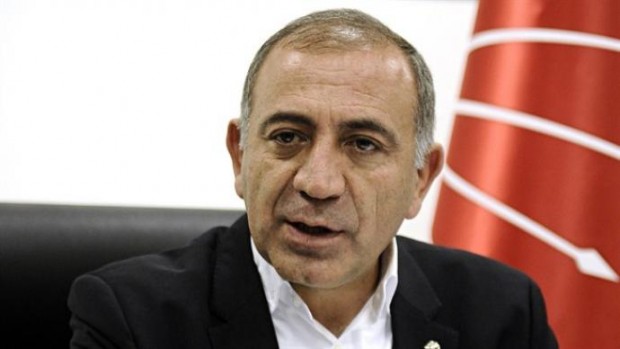
File photo of Gürsel Tekin, vice-president of Turkey’s Republican People’s Party. (AAA)
Istanbul, Asharq Al-Awsat—Vice President of the Turkish opposition Republican People’s Party, Gürsel Tekin, called on Turkish prime minister Recep Tayyip Erdoğan to put aside his intransigence and listen to the Taksim Square protesters.
Speaking exclusively to Asharq Al-Awsat, Tekin condemned Erdoğan’s unilateral decision-making, emphasizing that the Turkish prime minister is responsible for the unrest currently engulfing the country. The senior opposition leader spoke about the nation-wide protests, Erdoğan’s policies, and what the future may hold for Turkey post-Taksim.
Erdoğan met with the protesters for the first time last night, saying that he would put redevelopment plans for Gezi park—the issue which initially sparked the protests—on hold until a court rules. This is a markedly more conciliatory tone from the prime minister in comparison to previous statements condemning the protesters and speculating of foreign involvement.
This interview has been edited for length.
Asharq Al-Awsat: How did things reach this juncture in Taksim Square and Gezi Park?
Gürsel Tekin: The issue is not like some people are trying to frame it, namely that this is a crisis over Gezi Park. As you see, the Turkish people have taken to the streets across the country, while all districts of Istanbul are witnessing protests day and night against the policies of the regime, and particularly against what Erdoğan has done over the recent period in terms of unilateral decision-making. He wants Turkey and the Turkish people to move according to his own vision, and he does not give any consideration to the youth who are exercising their rights in a democratic manner. Tens of thousands of youth marched across the Bosphorus Bridge calling for freedom and democracy and demanding that all political parties intervene to pressure the government to end its undemocratic practices. We in the Republican People’s Party cannot understand Erdoğan’s intransigent stance towards the will of the people.
Q: Some people are claiming that the Taksim Square demonstrations are using the Tahrir Square protests and Occupy Wall Street Movement as a model. Do you agree?
We cannot compare what is happening in Taksim Square with what happened in Tahrir Square, nor can we equate the situation in Turkey with that of the Middle East states; what happened in Tunisia and Egypt is different than what is happening in Turkey, which passed through a difficult time in order to lay the foundations of democracy decades ago. We have a long history with the democratic experience; Turkey is not in the midst of a financial crisis as Egypt and Tunisia experienced. Turkey is experiencing a period of economic growth, and has an advanced economy. Therefore to compare what is happening in Turkey with the Arab Spring reduces the value and importance of the sit-ins and strikes.
Q: So what exactly is happening?
This is simply a revolution against the Erdoğan ideology which derives its strength from banning everything, such as banning alcohol, implementing the so-called 4+4+4 system (4 years of primary school, 4 years of middle school, and 4 years of high school), and likening the authors of the old constitution as two drunkards. In addition to this, the Erdoğan ideology has also insulted other sects, directly and indirectly, and sought to transform the parliamentary system in Turkey into a dictatorship where all power is held by one man. All of these policies exploded the situation across the country.
Q: How can we resolve this crisis?
All that Erdoğan has to do is to listen to the voices in Taksim Square and eliminate the laws that he has issued banning many things, for these prohibitions represent a breach of our freedom of expression.
In 2002 Erdoğan said that he dreams of a Turkey where there are no laws that limit individual freedoms. This was the reason why the Turkish people voted for him; however if we look at the situation today we see that there has been a significant retreat from 2002 in the area of individual and democratic rights due to the laws that he issued. We, as a party, do not understand why we are going backwards rather than moving forwards.
Q: Do you believe that the protests will affect the policies that the government is pursuing towards the Middle East, and particularly Syria?
When we look at the map of the Middle East, we see that we share borders with Syria, Iraq, and Iran, and we all share relations similar to family kinship. Escalation creates problems and enmity between these neighbors, and this is not reasonable or logical. Therefore, the Turkish government has no choice but to change the antagonistic policies it is carrying out towards its neighbors, particularly following these protests which have engulfed all Turkish cities.
Q: Turkey’s stock exchange and financial market are faltering, is this due to the protests or is Turkey truly in the midst of an economic recession?
The statement issued by Erdoğan caused this. This statement resulted in a fall in the stock market which reflected on the wider Turkish economy. Erdoğan failed to take into account the feelings of the peaceful protesters. He described them as capulcu (layabouts) and so it is natural that the people will take to the streets when they hear such statements being made by the prime minister. His threatening the media outlets not to cover the protests also pushed the people to take to the street to see what is happening. I repeat that Erdoğan must put aside stubbornness and obey the demands of the protesters otherwise the Turkish economy will be damaged, as will Turkey itself.
